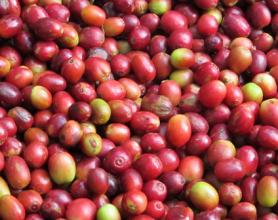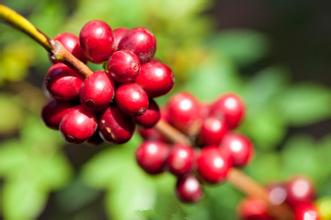Description of Taste and Flavor of Yunnan Tieka Coffee beans introduction to the producing areas of Grinding scale varieties
Description of Taste and Flavor of Yunnan Tieka Coffee beans introduction to the producing areas of Grinding scale varieties
Although the environmental problems of coffee cultivation can reach the standard of hot areas, they are far away from the equator, evaporation, large-scale coffee cultivation in Yunnan is less than 1100m above sea level, the severe drought in Yunnan in recent years, and the frost period in the producing areas, and so on, all make coffee planting can not be guaranteed normally, which directly affects the quality of coffee production. As for other processing problems, not to mention the quality of farmers, tea farmers drink tea for generations, but farmers may not have had coffee in their lives.
After drinking the original, simple coffee, we approached what is known as the oldest coffee forest in China. At this time, the ancient coffee trees have produced clusters of coffee beans, although they will not mature until next month, but some of them will show bright red. Qi Fenghua said that this forest is considered to be the oldest ancient coffee forest in China. There are 1134 plants in 13 mu, 24 of which have a history of more than 100 years, which were introduced and planted by French missionaries when they built a church in Zhu Kula in 1892. Local Tan Jialin said: "the reason why the 13 mu ancient coffee forest in Zhukula area is listed as the oldest coffee forest in China is that it has 24 ancient coffee trees more than 100 years old, all of which are pure Yunnan small-grain coffee. Its superior quality is very rare. It is the ancestor of Chinese coffee, especially Yunnan small-grain coffee, and has extremely high scientific research value and industrial development value."
Since the early 1990s, in order to improve the enthusiasm of farmers, Baoshan Rezuo has introduced a Katim variety bred by the Portuguese Coffee Rust Research Center with Timor (medium grain, Tim) and Caturra (small grain, Kaddura), and has been popularized and planted with numerous titles. This variety has well solved many factors such as disease and insect disasters and drought resistance, and the important thing is that the yield per mu has nearly doubled. Although it has increased the enthusiasm of farmers to grow coffee, it has also become the reason for the low quality of Yunnan coffee from now on. At the same time, Nestl é and Maxwell entered China and began to promote coffee varieties suitable for instant coffee in Pu'er and other places: S288, natural hybrid of large seed and small seed and S26 of kent hybrid of Arabica Kent in India, which had first-class rust resistance, but with low planting difficulty and adaptability, it basically stopped planting at the beginning of the 20th century.
Yunnan has a long history of growing coffee and has a unique climate advantage. Yunnan small grain coffee has the characteristics of strong but not bitter, fragrant but not greasy, slightly sour and so on. According to the International Coffee Organization, Yunnan small-grain coffee is similar to Colombian small-grain coffee in quality, and its products are highly competitive in the market. At present, 95% of China's coffee raw materials are produced in Yunnan. Therefore, Yunnan's coffee industry has a far-reaching impact on the development of China's coffee industry.

Important Notice :
前街咖啡 FrontStreet Coffee has moved to new addredd:
FrontStreet Coffee Address: 315,Donghua East Road,GuangZhou
Tel:020 38364473
- Prev

Flavor description of Brazilian Mojiana Coffee beans introduction of varieties in taste producing areas
The flavor description of Brazilian mojiana coffee beans the introduction of varieties in the taste producing areas has proved that Brazil also has the ability to produce gourmet coffee and small batches of coffee. The local boutique coffee can not only be provided by small-scale coffee farmers. The main coffee producing areas in Brazil are Sulde Minas South Minas, Matas de Minas Minas Southeast Forest region, Cerrado Syracuse, Chap.
- Next

Description of flavor and flavor of coffee beans in El Salvador
El Salvador coffee beans characteristic flavor description taste variety production area introduction in El Salvador, Cuscarpa region is rich in coffee beans is the best, its weight is slightly light, aromatic, pure, slightly sour. Like Guatemala and Costa Rica, coffee in El Salvador is graded according to altitude, and the higher the altitude, the better the coffee. The best brand is
Related
- Detailed explanation of Jadeite planting Land in Panamanian Jadeite Manor introduction to the grading system of Jadeite competitive bidding, Red bid, Green bid and Rose Summer
- Story of Coffee planting in Brenka region of Costa Rica Stonehenge Manor anaerobic heavy honey treatment of flavor mouth
- What's on the barrel of Blue Mountain Coffee beans?
- Can American coffee also pull flowers? How to use hot American style to pull out a good-looking pattern?
- Can you make a cold extract with coffee beans? What is the right proportion for cold-extracted coffee formula?
- Indonesian PWN Gold Mandrine Coffee Origin Features Flavor How to Chong? Mandolin coffee is American.
- A brief introduction to the flavor characteristics of Brazilian yellow bourbon coffee beans
- What is the effect of different water quality on the flavor of cold-extracted coffee? What kind of water is best for brewing coffee?
- Why do you think of Rose Summer whenever you mention Panamanian coffee?
- Introduction to the characteristics of authentic blue mountain coffee bean producing areas? What is the CIB Coffee Authority in Jamaica?

